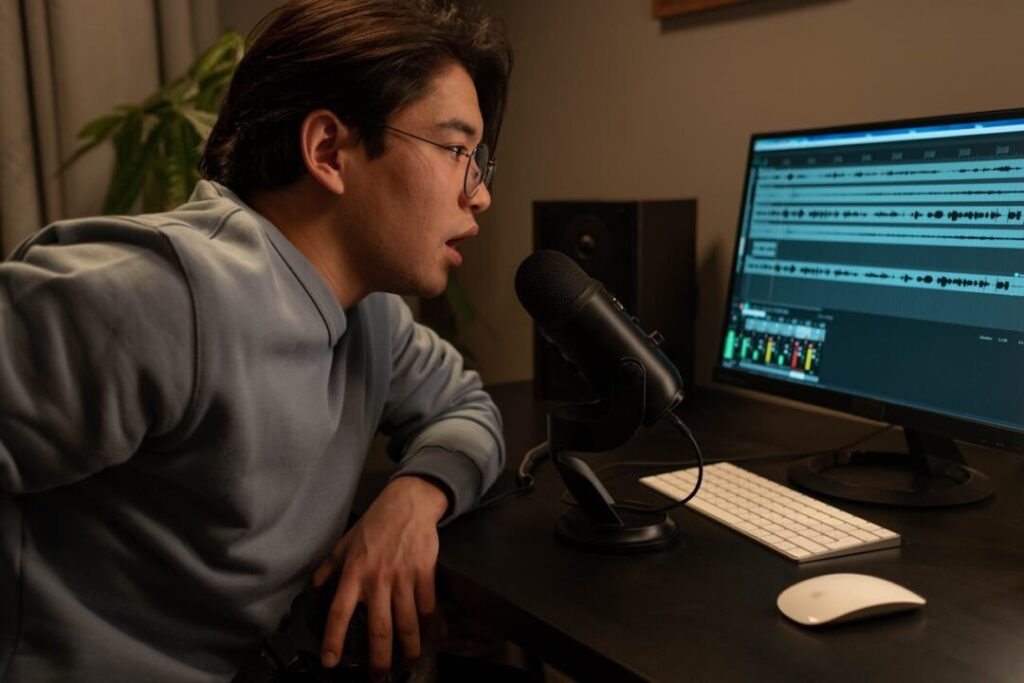You’ve probably seen someone mention it online and thought, “Wait, people get paid just to talk?” And yeah, that’s kinda the deal—but it’s not just talking into a mic. There’s a little more to it, and if you’re the type who loves reading stories out loud or doing silly voices in the car, you might be sitting on a side hustle goldmine without even knowing it.
First—figure out what kind of voice work actually suits you
Before you even think about buying a mic or signing up for any websites, you’ve gotta know what kind of voice work you’d enjoy. There’s a big range—stuff like commercials, audiobooks, character voices for video games, cartoons, even meditation apps.
If you’re the type who’s always reading to your kids with extra flair or you’ve got a bunch of impressions you bust out at parties, that’s a clue. Audiobooks and character voice work might come naturally to you. On the flip side, if you’ve got that smooth, calm energy, maybe you’d crush it doing guided sleep meditations or corporate training videos.
This part really matters because if you skip it, you’ll end up chasing gigs that don’t suit your style, and it’ll just feel like a grind.
Gear up—but don’t overthink it
You don’t need a studio with foam-padded walls and blinking lights to get started. What you do need is a decent microphone and a quiet place to record. Think closet full of clothes, not kitchen with clanking dishes.
A USB mic like the Blue Yeti or the Audio-Technica ATR2100x is good enough for beginners. If you’re just starting out, focus on getting clean sound in a quiet environment. That’ll take you further than dropping $500 on gear you don’t know how to use yet.
Oh—and don’t record your demo on your phone. That’s a no.
Where to find work
Once you’ve played around and recorded a few practice samples, it’s time to start looking for real gigs. You’ve probably heard of sites like Voices.com or Fiverr, right? Those are platforms where clients post voiceover jobs and you can audition. Some charge fees, some don’t. Some are better for newbies, some are more for pros.
Take your time and research each one. If you’re new, don’t drop money on expensive memberships right away. Build a few solid samples, polish your profile, and then try your hand at auditions. If you’re curious about why your Fiverr gigs might not be selling, you’ll want to read this post—it lays out exactly what folks get wrong and how to fix it.
But hey, don’t rely on platforms alone.
Going local might be your secret weapon
Here’s something a lot of beginners overlook: local work. Businesses in your area need voiceovers too—radio ads, phone menus, explainer videos for their websites. And most of them aren’t looking on fancy platforms. They might not even know they need a voiceover until you pitch them on it.
Start checking out your local business directories, hit up events, or even just ask around. Seriously, your neighborhood yoga studio might need a calm voice for their new guided meditation. You could be it.
This kind of DIY hustle is how a lot of side gigs really get off the ground. And if you’re into learning how people turn low-budget ideas into cash, check this guy who used a printer to stack $100K. Proof that the grind is real—and pays off.
Demos matter more than you think
A voice demo is your calling card. Think of it like your resume, except it has to sound good and hook someone in 30 seconds or less.
If you want clients to take you seriously, your demo has to sound polished. You don’t have to drop hundreds on a professional producer right away, but it does need to show off your strengths and be tailored to the kind of gigs you want. Don’t just read anything—pick scripts that match your niche.
And no, a single demo that tries to be everything won’t cut it. If you’re aiming for audiobooks and explainer videos, make two short demos. One for each. Simple.
Practicing your voice is a real thing
This might sound cheesy, but your voice is your instrument, and you’ve gotta train it. Just like a guitarist does scales or a singer does warmups, you should be doing daily vocal exercises—tongue twisters, breath control, emotional reads.
Even reading children’s books out loud in different moods can help. It sounds silly, but it builds your range fast. If you’re the kind of person who needs structure, try out a vocal coach or a short online course. And remember, the more comfortable you are with your voice, the more confident you’ll sound—and clients will hear that.
Be patient, because it’s gonna take a minute
Getting into voice acting isn’t some get-rich-quick thing. It’s like any other side hustle—there’s a ramp-up. You’re not going to land your first few auditions. And that’s normal.
Treat each audition as practice. Keep track of which ones you sent, what type of gig it was, and what demo you used. Over time, you’ll start to see patterns—what works, what doesn’t, what kind of clients vibe with your style.
That’s how you go from “maybe I could do this” to actually getting paid.
And if you’re into side hustles that start slow but can turn into something serious? You’d probably enjoy this breakdown where we show how stacking smaller gigs can lead to a big payout over time.
Stay plugged in to the voiceover community
Here’s something that helps way more than people realize—don’t do this alone.
There’s a whole world of voice actors out there sharing tips, feedback, gig leads, and even rants when things get frustrating. Facebook groups, subreddits, Discord servers, you name it. Jump in, ask questions, post your demos, get feedback, share what’s working for you.
It’s not just about “networking” in the cringey business sense. It’s about staying connected so you’re not spinning your wheels in the dark.
Some of your best learning will come from other people figuring it out alongside you. Just like in this article, nobody’s gonna hand you a perfect roadmap. But if you stay curious, keep learning, and build real relationships, you’ll move faster than you think.
Quick real talk before we go
Voice acting is fun, but it’s still a hustle. You’ve got to put in the hours, deal with some rejection, and be cool with doing the unglamorous stuff like editing your own audio and tracking down leads.
But the upside? You get to use your own voice to make money. That’s pretty wild when you think about it.
So if you’ve got the itch, start small. Get a mic. Play around. Learn your strengths. And then get out there and make some noise—literally.
And if you’re looking for more side hustle inspo, don’t forget to hit up our main blog. We’ve got wild stories, deep dives, and practical breakdowns on everything from flipping books to running a cookie business.
Let your voice do the talking—and the earning.
https://www.youtube.com/watch?v=OUMP45LVJug






